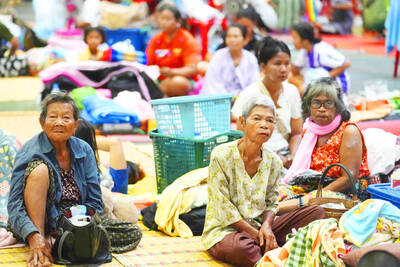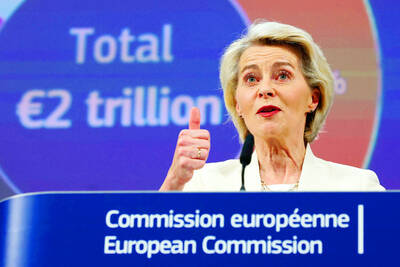Myanmar’s cyclone-devastated Irrawaddy Delta and Indonesia’s Sumatra island face high risks of arsenic contamination in groundwater that could cause cancer and other diseases in residents, a new study stated.
Using a digitalized model that examines geological features and soil chemistry in Southeast Asia, researchers writing in the peer-reviewed journal Nature Geoscience mapped several likely hot spots that had never been assessed for arsenic risks.
“Obviously, there is concern,” said Michael Berg, one of the five authors, who is a senior scientist at the Swiss Federal Institute of Aquatic Science and Technology in Dubendor, Switzerland. “If you look at our data, there is risk of arsenic in the ground water.”
Arsenic, especially in drinking water, is a global threat to health, affecting more than 70 countries and 137 million people. The country worst affected is Bangladesh, where hundreds of thousands of people are in danger of dying from cancers of the lung, bladder and skin.
Odorless and tasteless, arsenic enters water supplies from natural deposits in the ground or from agricultural and industrial practices. Arsenic is poisonous when consumed in high doses, but even smaller amounts can cause cancer, skin problems and abnormal heart rhythms.
Berg and the other authors determined a high risk of arsenic contamination exceeding World Health Organization guidelines in Myanmar’s Irrawaddy Delta, a low-lying area hit by a May cyclone that killed at least 84,537 people.
Their models also found that 100,000km² of Sumatra’s east coast was at risk as well as the Chao Phraya river basin in central Thailand — although the dangers in the Chao Phraya were lower because residents in the area tap deeper aquifers.
Researchers said regions with organic-rich sediment containing silt and clay have a higher likelihood of arsenic contamination.
“These are very young sediments. Only in young formation do we find that arsenic can be released from the sediment,” Berg said on Friday, adding that arsenic in soil that is much older has been mostly washed away.
Berg said he hopes the maps they developed could serve as “a red flag” for authorities to take precautions before building wells or other water facilities in areas deemed at high risk of arsenic contamination. Until now, testing for arsenic has been rare in many regions because it is costly and time consuming, he said.
“Maps pinpointing areas vulnerable to arsenic contamination can guide households at risk of arsenic contamination, as well as scientists and policy makers to initiate early mitigation measures and protect populations from chronic arsenic poisoning,” the authors wrote.
Lex van Geen, a geochemist at Columbia University’s Lamont-Doherty Earth Observatory who has studied arsenic contamination in Bangladesh and did not participate in the study, said it should be lauded for drawing attention to areas where little research has been done on the arsenic threat, such as Myanmar. But he said the digital models do not identify areas well below the surface where water quality is good.
“Using the mapping based on surface geology will identify settings where arsenic could be high in shallow groundwater,” van Geen said. “What it can’t tell you is how deep you might have to go to reach the low arsenic water, which is really what matters from a mitigation point of view.”

FOREST SITE: A rescue helicopter spotted the burning fuselage of the plane in a forested area, with rescue personnel saying they saw no evidence of survivors A passenger plane carrying nearly 50 people crashed yesterday in a remote spot in Russia’s far eastern region of Amur, with no immediate signs of survivors, authorities said. The aircraft, a twin-propeller Antonov-24 operated by Angara Airlines, was headed to the town of Tynda from the city of Blagoveshchensk when it disappeared from radar at about 1pm. A rescue helicopter later spotted the burning fuselage of the plane on a forested mountain slope about 16km from Tynda. Videos published by Russian investigators showed what appeared to be columns of smoke billowing from the wreckage of the plane in a dense, forested area. Rescuers in

Philippine President Ferdinand Marcos Jr is to meet US President Donald Trump this week, hoping Manila’s status as a key Asian ally would secure a more favorable trade deal before the deadline on Friday next week. Marcos would be the first Southeast Asian leader to meet Trump in his second term. Trump has already struck trade deals with two of Manila’s regional partners, Vietnam and Indonesia, driving tough bargains in trade talks even with close allies that Washington needs to keep onside in its strategic rivalry with China. “I expect our discussions to focus on security and defense, of course, but also

POINTING FINGERS: The two countries have accused each other of firing first, with Bangkok accusing Phnom Penh of targeting civilian infrastructure, including a hospital Thai acting Prime Minister Phumtham Wechayachai yesterday warned that cross-border clashes with Cambodia that have uprooted more than 130,000 people “could develop into war,” as the countries traded deadly strikes for a second day. A long-running border dispute erupted into intense fighting with jets, artillery, tanks and ground troops on Thursday, and the UN Security Council was set to hold an emergency meeting on the crisis yesterday. A steady thump of artillery strikes could be heard from the Cambodian side of the border, where the province of Oddar Meanchey reported that one civilian — a 70-year-old man — had been killed and

‘OPPORTUNITY TO ENGAGE’: Antonio Costa and Ursula von der Leyen are to meet Chinese President Xi Jinping to discuss EU-China relations and geopolitical challenges Top leaders from China and the EU are to hold a summit in Beijing this week, as the major economic powers seek to smooth over disputes ranging from trade to the Ukraine conflict. Beijing and Brussels have been gearing up to mark the 50th anniversary of the establishment of diplomatic ties, but a suite of squabbles over state subsidies, market access and wartime sanctions have dampened the festivities. A spokesperson for the Chinese Ministry of Foreign Affairs yesterday confirmed that European Council President Antonio Costa and European Commission President Ursula von der Leyen would visit on Thursday. The statement came after the EU